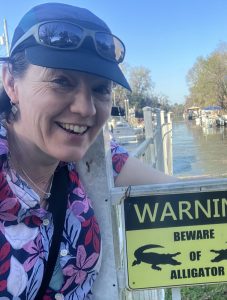A passion for teaching and marine invertebrates: welcome to Marjorie Wonham
As much as she loves research, Marjorie Wonham, the newest faculty member in the UW Marine Biology program, is passionate about teaching. Joining the program as an Associate Teaching Professor based at Friday Harbor Laboratories (FHL), Marjorie brings expertise to our program, having established herself as a researcher in marine invasion ecology and a leader in pedagogy in the marine sciences and field-based education.
Where did your love of the marine world begin?
I grew up in Toronto, with no ocean in sight. My first time at the ocean was on a summer field class to the Huntsman Marine Science Center in New Brunswick, where two things blew me away.
One of our tasks was dissecting a sea cucumber, which doesn’t look like much from the outside, but the inside was incredible. So many intricate colors and shapes. The other part was marking limpets with nail polish to map where they went. How did they find their way home every day? As I encountered the mind-blowing mysteries of marine invertebrates, I thought, “These are my people.”
Where did you career take you before joining UW?
I started working on marine introduced species and their transport around the world in ships’ ballast water. That’s how I came to love plankton. Then I did my PhD at UW in the zoology program. This work focused on the ecological interactions of non-native species in their new communities and involved lots of fieldwork off the coast of the Olympic Peninsula and in Padilla Bay near Anacortes.
For my post-doc at the University of Alberta (a post-doc is a training-focused position available to people who have earned a doctorate), I worked with a very collaborative mathematical biological modeling group, where I overcame a long-standing fear of mathematics and learned new ways of thinking about interesting problems.
Throughout and following my grad studies and post-doc, I was lucky to be able to develop and teach my own courses and to collaborate in richly rewarding co-teaching environments at marine labs in California, Washington, and British Columbia. 
When I joined Quest University, I had the exciting chance to help build an interdisciplinary degree program. My teaching and scholarship were anchored in marine biology but broadened over time to encompass other disciplines: pedagogical research, biology and poetry, and marine social sciences. I am interested in questions such as: What is it like to be a marine invertebrate? What are the most effective ways to teach and learn? How can arts and sciences enhance each other? How do we manage socio-ecological marine systems?
Throughout my academic journey and career, my innate love of teaching has flourished through interactions with students, colleagues, and mentors – from TAing with gifted lab coordinators at UW, to co-instructing with wonderful colleagues in the classroom and in the field, to working with motivated students to design and refine course components. Initially I approached teaching as a scientist, but the more I do it, the more I’ discover other interesting frameworks that also inform how I teach.
What are you most excited about in your new position?
Lots of things, but I’ll highlight two. The chance to help contribute to building this relatively new marine biology major is very exciting. A lot of hard work has gone into creating it, and as it comes into its own, we have a chance to shape and develop it into a superb and signature UW major that really stands out. I’m really looking forward to collaborating with my new colleagues on this.
The second thing is focusing on the integrative field experience component of the major at FHL. I want to really develop a diversity of experiential ways for students to experience marine biology by doing field work, doing lab work – really doing marine biology.
Any advice for younger generations just setting out on their marine biology studies?
You will never regret taking a marine biology course! We’re surrounded by terrestrial environments and organisms – we are terrestrial animals. But marine biology opens up a world that is a lot less obvious to us. Any marine biology course will introduce you to incredibly different ways of thinking about what it means to be a living creature.
Another piece of advice is to think beyond what you are interested in and think about why you’re interested in it. If you know why you are studying what you’re studying, you’ll ignite your passion for learning. Soak up everything in your marine biology education and experiences: even if you do not end up becoming a marine biologist, it’s a phenomenal education with innumerable transferable skills that will serve you well in any domain – and you’ll always be able to contribute a uniquely oceanic perspective to any discussion.
We have to ask – what’s your favorite marine organism?
Definitely marine invertebrates, but it’s so hard to choose from among 30+ phyla! I have a special fondness for sea cucumbers, for kinorhynchs, and for the unexpected. When I turn over a rock and see a species I recognize, I’m delighted. And when I see one that I don’t know, I’m even more stoked because now I have a mystery to solve. The way marine invertebrates make a living is intriguing: it’s so very different from the way we do. I think the world must look very different from their perspective. I’d love to be able to ask them.